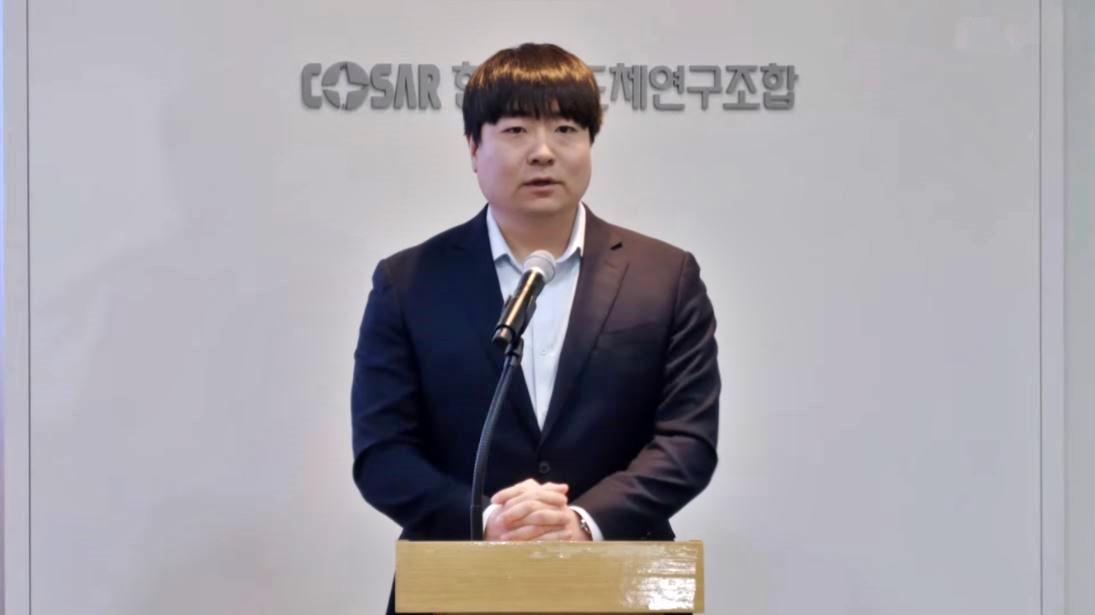바이든 행정부에서부터 이어져온 반도체·AI 등 첨단산업 관련 수출·기술 규제가 오히려 중국 산업의 성장동력을 보장하고 있는 것으로 분석됐다. 글로벌 장비사의 중국향 매출 비중 증가와 미국 반도체·AI·클라우드 기업들의 규제 압박이 교차하며 중국을 중심으로 한 시장 파편화화가 전망되고 있는 것으로 나타났다.

▲김혁중 대외경제정책연구원 부연구위원
반도체 업계, 트럼프 정부서 바이든 규제 철폐 기대
中, 美 견제 불구 첨단 장비 싹쓸이...시장 파편화 진행
바이든 행정부에서부터 이어져온 반도체·AI 등 첨단산업 관련 수출·기술 규제가 오히려 중국 산업의 성장동력을 보장하고 있는 것으로 분석됐다. 글로벌 장비사의 중국향 매출 비중 증가와 미국 반도체·AI·클라우드 기업들의 규제 압박이 교차하며 중국을 중심으로 한 시장 파편화화가 전망되고 있는 것으로 나타났다.
한국반도체산업협회(KSIA)가 20일 2025 제1차 시스템 반도체 포럼을 개최해 ‘미국 반도체 전략의 현재와 미래’를 주제로 반도체 산업 정책 발표를 진행했다.
김혁중 대외경제정책연구원 부연구위원은 이날 발표에서 “트럼프 발언에서 가장 특징적인 부분이 바이든 행정부의 프랜차이즈 법안이었던 반도체법을 폐기하겠다는 점”이라고 지적해 반도체 지원을 축소하는 움직임을 언급했다.
반면 “중국 내 AI 전방 수요 활성화로 자체 설계 반도체를 중국 파운드리가 제조하고 이에 중국산 장비를 더 많이 사용해야 하는 상황”이라고 말해 미중 간 대조되는 상황이 포착됐다.
■ 반도체 업계, 트럼프 정부서 바이든 규제 철폐 기대
반도체 지원 철폐는 업계 리스크로 작용하는 반면, 반도체 기업을 옥죄고 있던 AI 반도체 수출 규제와 클라우드 서비스 규제 등이 기업에 대한 과도한 성장 억제와 민감정보 유출 등으로 이어질 수 있다는 불만을 야기하며 업계는 트럼프 행정부에서 규제가 철폐되길 기대하고 있다.
과거 반도체는 연산 성능을 조건으로 수출 규제가 되었는데, 600GB/s 조건이 2023년 10월 폐지되면서 AI 반도체 규제 대상이 더욱 포괄적으로 확대됐다. 최근 그 통제 범위는 더욱 넓어지며 HBM도 미국의 통제 범위 안으로 들어왔다고 김 위원은 평가했다.
김 위원은 트럼프 정부에서 철폐될 것으로 예상되는 바이든 행정부 규제 몇 가지를 예상했는데, “AI 반도체 쿼터를 만들어 특정 국가에 반도체 수입량에 제한을 두는 규제가 기업의 사업권 침해와 기밀 보장에 위배되는 측면이 있다”고 전했다.
이러한 규제는 판매 데이터를 미국 상무부에 보고해야 하는 등 기업의 민감정보가 침해되는 측면이 있어 규제철폐론자인 트럼프가 이를 어떻게 받아들일지 귀추가 주목된다는 것이다. 이는 다가오는 4월 2일 트럼프의 상호관세 발표일에 관전 포인트로 떠오르는 이유 중 하나이다.
또한 AI 모델에 대한 기술 수출 통제, 규제국의 AI 모형 훈련을 금지하는 클라우드 서비스 통제 등이 대표적인 미국 기업의 큰 부담을 가중하는 규제인 것으로 나타났다. 이는 곧 트럼프 행정부에 대한 기업규제 철폐를 합리적으로 기대하는 요인인 것으로 설명했다.
■ 中, 美 견제 불구 첨단 장비 싹쓸이
현재 미국이 중국에 대한 반도체 장비 수출 제재에도 불구하고 김 위원이 분석한 중국 해관 통계와 ASML, TEL 등 첨단 반도체 장비기업들의 실적 수치는 중국 제조사들의 장비 사재기 현상이 관측된다고 평가했다.
노광기 부문에서 2024년 1억달러 이상의 장비가 산둥성으로 반입된 것이 확인되며 하이엔드급 장비까지 들어간 것으로 추측했으며, 기업 실적 자료에서도 이러한 점이 교차 검증된다고 덧붙였다. 2024년 ASML과 TEL의 대중국 매출 비율은 40%대를 기록했다.
이러한 경향성이 미국 기업에서도 동일하게 관측된다는 김 위원은 “전세계 반도체의 40%를 중국이 제조하지 않는데 장비를 40% 수입할 리 없다”고 강조하며 장기적인 관점에서 입도선매(立稻先賣)가 이뤄지고 있음을 시사했다.
김 위원은 “미국의 수출 통제와 규제는 중국 기업 입장에선 중국 내 독점 사업을 부여 받은 것과 똑같다”면서, “이 기회를 활용해 중국 기업들은 여러 과제를 극복하면서 반도체 설계 및 제조 수준을 향상해야 하는 상황”이라고 분석했다.
이에 현재 딥시크 등 AI 애플리케이션과 모형이 발전하고 이에 따른 특수 목적 반도체도 난립하게 되면서 엔비디아 독재 체제에서 여러 기업들의 기회가 모색되는 상황이 될 수 있다고 전망했다. 중국 자체 생태계 구축과 파편화가 심화된다면 반도체 시장의 다각화 체제도 충분히 그려지는 상황이다.